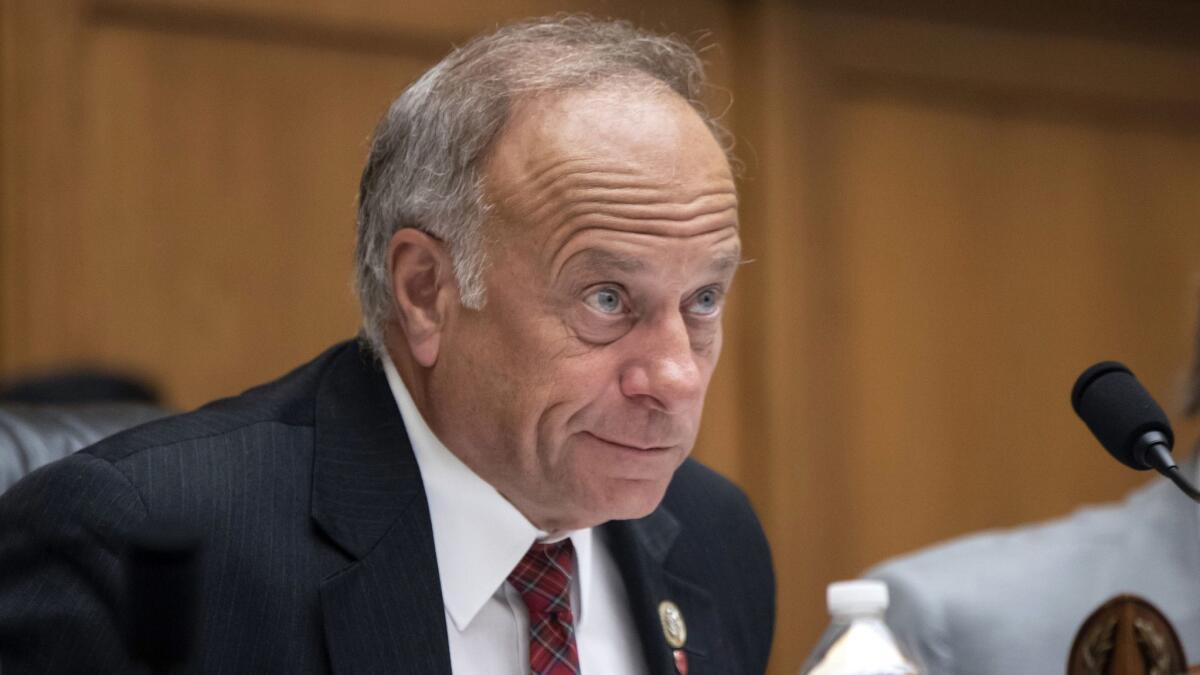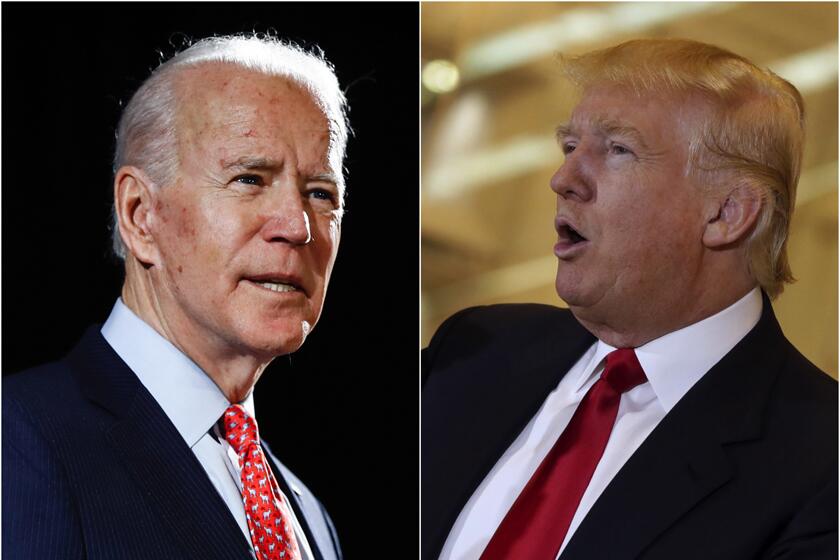Nine-term Iowa GOP Congressman Steve King may lose his seat at the hands of his own party

- Share via
AMES, Iowa — Rep. Steve King is among the most conservative members of Congress, and he represents a district so red that Donald Trump won it by 27 percentage points in 2016. Yet the nine-term congressman is at risk of losing his seat — at the hands of his own party.
A broad spectrum of Iowa and national Republicans — from moderate establishment types to conservative evangelical leaders — are leading an expensive effort to oust the controversial congressman. On Tuesday, he faces off with well-financed GOP state legislator Randy Feenstra and other rivals in a primary that many Iowa strategists say is too close to call.
“I think Steve King is in trouble, and it’s been probably one of the most fascinating things to watch,” said Craig Robinson, a former state GOP official who founded the Iowa Republican website. “In my time in politics, I’ve never seen anything quite like it.”
King is arguing that he is being chased from office by “the swamp” because he has never wavered in his conservative principles about issues such as border control and abortion.
“You’ve seen attack ads and mailers paid for by billionaire coastal RINO-NeverTrumper, globalist, neocon elites,” King wrote in an editorial in the Sioux City Journal, urging voters in Iowa’s 4th Congressional District to remain with him. “… I’ve said ‘no’ to them for years. I know their names and their agenda. I answer only to 4th District voters.”
President Trump and Joe Biden took divergent approaches to the police killing of George Floyd and the ensuing protests in Minneapolis.
King, 71, has a long history of making incendiary statements about race, immigration, rape and other matters, and for having associations with far-right European leaders.
In 2013, when speaking about immigrants, King said, “For every one who’s a valedictorian, there’s another 100 out there who weigh 130 pounds — and they’ve got calves the size of cantaloupes because they’re hauling 75 pounds of marijuana across the desert.”
Four years later, as he tweeted in support of nationalist Dutch politician Geert Wilders, King wrote, “Wilders understands that culture and demographics are our destiny. We can’t restore our civilization with somebody else’s babies.”
In 2018, he called Mexican immigrants “dirt” during a campaign event.
For more than a decade, these remarks and these relationships drew rebukes but did not appear to matter to many of Iowa’s GOP leaders and voters, though they enraged Democrats.
“I don’t like him. I don’t think he’s a very good representative. And I don’t appreciate his rhetoric,” said Dana Cheek, a mental health therapist from the town of Nevada. “It’s not based in logical thought, it’s not based in fact, and it’s not really based on much of Iowa.”

Cheek, who gave her age as late 40s, said she would prefer that King’s Democratic challenger J.D. Scholten win the November election. But she would take Feenstra over King.
“The rhetoric would be different, and it wouldn’t embarrass Iowa,” she said.
Iowa Republicans’ views appear to be changing. During the 2018 midterm elections, when Democrats regained control of the House, King won his race by less than 4% over Scholten. Republicans worry that if King does as poorly in November, it could affect President Trump and Sen. Joni Ernst’s reelection bids because his district is the greatest source of Republican votes in the state.
Two months later, in January 2019, King received widespread condemnation after telling the New York Times: “White nationalist, white supremacist, Western civilization — how did that language become offensive?” King said he was misquoted, but GOP leaders condemned him and stripped him of his seats on the judiciary, agriculture and small business committees.
The outside groups opposing King and supporting Feenstra, which have spent about $800,000 in the race, have not directly seized upon King’s controversial statements in an effort to avoid alienating voters who have long supported the congressman.
Instead, they are arguing that he has been neutered because in one of the most rural and socially conservative districts in the nation, King can no longer represent farmers on the agriculture committee, or antiabortion advocates on the judiciary committee.
“He’s never been a very effective congressman and now he’s completely ineffective,” said David Kochel, a veteran Iowa GOP strategist who is advising Priorities for Iowa, a super PAC supporting Feenstra.
It’s a message that resonated with Alex Burgher, a 58-year-old mechanic from Ames.

The independent has voted for Republicans before, but he does not support King.
“I just don’t think he’s done a very good job for us,” Burgher said as he sipped an amaretto and Coke at the Whiskey River restaurant in downtown Ames. “You know, getting kicked off the committees and everything else. He can’t do much for Iowa.”
The Priorities for Iowa group is run by political operatives with ties to Gov. Kim Reynolds, who has declined to weigh in on the race. King served as a co-chair of her campaign in 2018.
King supporters say such betrayal is proof of King’s unbendable principles.
“Congressman King won’t go along to get along. He’s his own man. He has convictions and principles and he’s not afraid to stand on them,” said Jacob Hall, 36, a conservative blogger in Sioux Center.
He questioned how Iowans’ lives were affected by not having King serve on committees in a Democratic-controlled House, and said no minority has ever accused King of racism during a nearly two-decade career in Congress.
“The reality is the people in the 4th District know Congressman Steve King. They know his principles. They know his values. They know his beliefs,” Hall said. “I don’t think Republicans in the 4th District put their faith in the New York Times.”
The race was also affected by the coronavirus crisis, which has devastated meat-packing plants and nursing homes in the district, and which ended the traditional retail campaigning that was King’s forte. Instead, the campaign largely played out on television, which greatly benefited Feenstra, who raised almost $1 million through May 13 — three times as much as the congressman. King, who limped into May with $32,000 in cash, isn’t on television.
“There’s no doubt Steve King has always been a retail candidate who would go to the chicken dinners, shake everyone’s hands, be the last one standing,” said evangelical leader Bob Vander Plaats, who with King co-chaired Texas Sen. Ted Cruz’s Iowa presidential campaign in 2016 and is now featured in a pro-Feenstra ad. “He hasn’t been able to do that, and he also hasn’t been on TV, and Randy has.”
More to Read
Get the L.A. Times Politics newsletter
Deeply reported insights into legislation, politics and policy from Sacramento, Washington and beyond. In your inbox three times per week.
You may occasionally receive promotional content from the Los Angeles Times.












